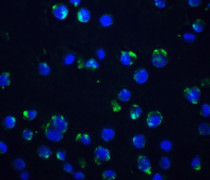ARG54368
anti-Acinus antibody
anti-Acinus antibody for ICC/IF,Western blot and Human
Cancer antibody; Cell Biology and Cellular Response antibody; Cell Death antibody; Gene Regulation antibody; Metabolism antibody
Overview
| Product Description | Rabbit Polyclonal antibody recognizes Acinus |
|---|---|
| Tested Reactivity | Hu |
| Predict Reactivity | Ms |
| Tested Application | ICC/IF, WB |
| Specificity | This antibody recognizes human and mouse Acinus (220 kD). |
| Host | Rabbit |
| Clonality | Polyclonal |
| Isotype | IgG |
| Target Name | Acinus |
| Antigen Species | Human |
| Immunogen | Peptide corresponding to aa 775-789 of human AcinusL, aa 17-31 of human Acinus S and aa 48-62 of human AcinusS’ which differ from those of mouse Acinus by one amino acid. |
| Conjugation | Un-conjugated |
| Alternate Names | fSAP152; ACINUS; Apoptotic chromatin condensation inducer in the nucleus; ACN; Acinus |
Application Instructions
| Application Suggestion |
|
||||||
|---|---|---|---|---|---|---|---|
| Application Note | * The dilutions indicate recommended starting dilutions and the optimal dilutions or concentrations should be determined by the scientist. | ||||||
| Positive Control | K562 |
Properties
| Form | Liquid |
|---|---|
| Purification | Immunoaffinity chroma-tography |
| Buffer | PBS (pH 7.4) and 0.02% Sodium azide |
| Preservative | 0.02% Sodium azide |
| Storage Instruction | For continuous use, store undiluted antibody at 2-8°C for up to a week. For long-term storage, aliquot and store at -20°C or below. Storage in frost free freezers is not recommended. Avoid repeated freeze/thaw cycles. Suggest spin the vial prior to opening. The antibody solution should be gently mixed before use. |
| Note | For laboratory research only, not for drug, diagnostic or other use. |
Bioinformation
| Database Links |
Swiss-port # Q9UKV3 Human Apoptotic chromatin condensation inducer in the nucleus |
|---|---|
| Gene Symbol | ACIN1 |
| Gene Full Name | apoptotic chromatin condensation inducer 1 |
| Background | A new inducer of chromatin condensation was recently identified and designated Acinus (for Apoptotic Chromatin Condensation Inducer in the Nucleus). Acinus is cleaved by caspase-3 and an additional protease to generate a small active peptide, p17, which causes chromatin condensation in vitro when it is added to purfied nuclei. Acinus also induces apoptotic chromatin condensation in cells. Acinus is ubiquitously expressed. Three different spliced forms of Acinus have been identified in human and mouse and are designated AcinusL, AcinusS, and AcinusS'. |
| Function | Auxiliary component of the splicing-dependent multiprotein exon junction complex (EJC) deposited at splice junction on mRNAs. The EJC is a dynamic structure consisting of core proteins and several peripheral nuclear and cytoplasmic associated factors that join the complex only transiently either during EJC assembly or during subsequent mRNA metabolism. Component of the ASAP complexes which bind RNA in a sequence-independent manner and are proposed to be recruited to the EJC prior to or during the splicing process and to regulate specific excision of introns in specific transcription subsets; ACIN1 confers RNA-binding to the complex. The ASAP complex can inhibit RNA processing during in vitro splicing reactions. The ASAP complex promotes apoptosis and is disassembled after induction of apoptosis. Involved in the splicing modulation of BCL2L1/Bcl-X (and probably other apoptotic genes); specifically inhibits formation of proapoptotic isoforms such as Bcl-X(S); the activity is different from the established EJC assembly and function. Induces apoptotic chromatin condensation after activation by CASP3. Regulates cyclin A1, but not cyclin A2, expression in leukemia cells. [UniProt] |
| Research Area | Cancer antibody; Cell Biology and Cellular Response antibody; Cell Death antibody; Gene Regulation antibody; Metabolism antibody |
| Calculated MW | 152 kDa |
| PTM | Phosphorylation on Ser-1180 by SRPK2 up-regulates its stimulatory effect on cyclin A1. Undergoes proteolytic cleavage; the processed form is active, contrary to the uncleaved form. |
Images (2) Click the Picture to Zoom In






